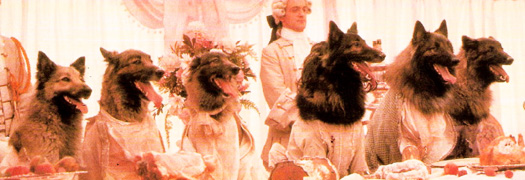
Features | Lists
By The Staff

40 :: Lokai
Transition
(Thrill Jockey)
“Roads” (and Transition, really) starts as perhaps the dreaming world’s impression of music: a slow swell of cracks, chimes, and bellows. Lokai, Austrian duo Florian Kmet and Stefan Németh, approach this smoky billow of sound as wranglers, not creators, managing to push clinks into percussion and dissonant high tones into a progression that treads on heavy tiptoes across the thin-ice measure. It’s quite tense, this opening scene, and that speaks to just one of this record’s great accomplishments: a ginger touch weaving a taut framework.
Elsewhere there are acoustic guitar strums and banjo plucks and accordion wheezes, so don’t get carried away thinking you got this record pegged already as concréte. And if now you’re thinking it must be folktronica or sound like instrumental Califone, you’d only be a fourth right. Mind you, I’m not claiming it defies all comparisons, either; at points it sounds like a Thomas Newman soundtrack, if a Thomas Newman soundtrack ever sounded vague and cool. The truth is, Transition is simply too liminal a record to inhabit any one niche that we may hasten to make ready for it. This thing’s got “organic” down to a molecular science, it’s both discovered and composed particles combined with chemistry like alchemy, it’s catalyzed grace inevitable…so that when the murk clears for a moment and “Volver” soars on those strums and wheezes, you soar with it, ready for where the equation’s deigned to take you. It’s in this way that Lokai smartly straddle the line between experimental and something a little more pop, making each side of that coin sound adventurous when contrasted with the other.
In terms of principle this beaut’s a post-modern symphony of eclectically appropriated sound, minimal in sum total while each detail is maximized yet deftly emphasized or de-emphasized in relation to the other elements, depending on its purpose at that point in the track. Supremely just moderators, Lokai make Transition an egalitarian forum for wholly different schools of music to come up against each other, to find the points in which they coincide and for the differences to serve contrapuntally. The “down side,” then, you might say, is that—as carefully crafted as the record is—the same amorphous connective fiber that renders Transition expansive and inclusive and broad also gives it all the signature of a blank canvas. Not even, really: this record doesn’t possess the attribute of no attributes. It is not ambient. It is not a noise record. But neither is it laptop pastiche or the new Steve Reich. It is not not those things because it can’t be them; it is not those things because those things can’t be Transition. A bit faceless, I suppose, the way I think about this music and how little that thinking has anything to do with the names “Florian Kmet” and “Stefan Németh”—which I plopped up top, I’ll admit, out of pure duty. But take note: it’s rare something so anonymous sounds so darkly gorgeous.
Chet Betz

39 :: Very Best
Warm Heart of Africa
(Green Owl)
I think of this album like I think of something seminal like Heart of the Congos (1977)—gorgeous vocals paired with restrained production from a normally forward-thinking producer (or, in Radioclit’s case, producers) making something that both is and isn’t traditional. What Warm Heart of Africa isn’t, however, is some template for feel-good global music in a post-postcolonial age, or whatever. It can’t be that, since for all the praise that this album gets for being innovative African pop or boundary-collapsing in and out of continent, very little has been said about how it’s basically just the best pop record released this year, as if we can’t appreciate it with and without the “African” tag at the same time. This is Malawi music, and the album wears singer Esau Mwamwaya’s identity on its sleeve, and this just isn’t the same debate that we all had last year about Vampire Weekend.
And so, in a rare instance of me accepting the forest and ignoring the trees, I’m going to say that having this debate at all denies what this record is: a pop record, or an African pop record, but either way a really damn good pop record, and one we should enjoy simply by virtue of the fact that this record is, perhaps more than any other record on this list, enjoyable—a nexus of gorgeous pop music construction glazed with Mwamwaya’s roots in traditional Malawi music and his and Radioclit’s work to blend and shift popular trends in African music with vague traces of an indie vocabulary.
Mark Abraham
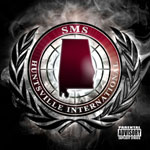
38 :: G-Side
Huntsville International Mixtape
(Slow Motion Soundz)
G-Side’s arrival is spirit-rendingly religious. Not religious like Sufjan, religious like the Reckoning: by the time the seismic, cheesy guitar riff kicks in on the title track, it’s apparent this will be a pyrotechnics-laced affair. The Block Beataz aim only to make bangers and their MC counterparts speak in boisterous absolutes. Huntsville International is cinematic in scope, but it’s more documentary than summer blockbuster, detailing without restraint the pomposity, cognizance, and talent of its participants without slant. “College Chicks” is terrible, but G-Side would like you to know their ugly licentiousness with the same intimacy as their undeniable flyness, which we learn tons about because the rest of the record is pretty much undeniable; that this bliss is smothered in trunk-rattling bass seems so well-earned. I’m sure “What It’s All About,” with its ostentatious Billy Joel sample, was fantastic before the Beataz gave it some eardrum-liquidating knock, but as a finished product it sits there: gaudy, grinning schlock injected with the strength of an MLK oration.
Which isn’t to draw unfair comparisons, though I have had more than a few peers describe portions of this tape as “spiritual,” a strange word to the lips of apathetic Generation Why-ers. But there’s a force behind the bars and beats of this tape that feel like they could move mountains at times. Listening to it I’ve had moments not unlike the point in an acid trip where one needs to tether oneself to reality to avoid floating away completely, the difference being I don’t bother—with Southern rap this smooth and unflinchingly great polluting my headspace, a living room couch is as good a pew as any.
Colin McGowan
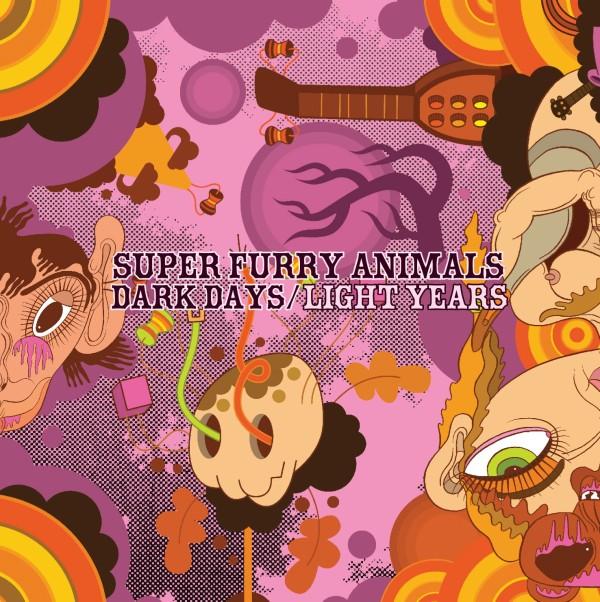
37 :: Super Furry Animals
Dark Days/Light Years
(Rough Trade)
The best thing about the Kraftwerk-referencing “Inaugural Trams,” with its cheeky “we have reduced emissions by 75%,” is that I’m pretty sure the Super Furries are genuinely excited about efficient green technology and just want to share it with you. The idea that technological progress and environmental preservation need not be antagonistic isn’t the only aspect of SFA’s philosophy that seems alien to this side of the Atlantic: the band’s appeal to both the coy and tongue-in-cheek as well as the pastoral and earnest is a bold tradition in Brit pop/rock which they proudly carry on.
Dark Days/Light Years, despite the dichotomy of the title, may seem at first to veer towards the lighter side of the band’s personality: there is no “Run, Christian, Run” or “Northern Lites” here. Instead, the band opts for their most immersive and consistent production yet (Goldstein noted a commonality with the Sea and Cake, which I think is apt), a collection of mostly up-tempo, smooth-as-butter songs with a few big, dumb anthems (“Crazy Naked Girls” and “White Socks/Flip Flops,” namely) thrown in for good measure.
But it isn’t all just ear candy: witness the absurdity built into the swagger of “Mt.,” the story of climbing a “huge fucking mountain” that turns out to be only two feet tall. This serves to highlight how the band values the process of making music as an end in itself, ending with the oft-quoted proverb, “No matter where you go, there you are.” Gruff Rhys seems to see the most trivial, annoying aspects of life—Neil Diamond albums, the inconveniences of “Inconvenience”—as merely an excuse to make beautiful, transcendent music. And in the middle of it all is the eight minute “Cardiff in the Sun,” a light-as-air ode to the Welsh capital where the band recently settled to record the album. It’s appropriate: they’ve never sounded more at home than they do here.
Joel Elliott

36 :: Antony & the Johnsons
The Crying Light
(Secretly Canadian)
Perhaps it’s the fact that I last heard it a little under a year ago, when it was so cold that to step outside was to experience the sensation of my hair turning solid, but everything about The Crying Light, down to the intense photograph of Butoh performer Kazuo Ohno, screams for the dead of winter. Whereas I Am A Bird Now occasionally felt at least somewhat lighter in structure and theme, Antony Hegarty’s third album, about “landscape and the future” (read: death), is a strikingly austere affair. There is no voice but Hegarty’s to be heard and the most rapturous, perhaps inviting moments, come fatally wounded on arrival; “Epilepsy is Dancing” tries to find beauty in the motions of a seizure, the triumph within “Aeon” is undercut by the ghostly presence of a child never born. A fair amount of talk surrounding the album concerns its vaguely environmental theme, perhaps spurred by “Another World,” where Hegarty sings of everything he’ll miss as either he or this world cease to exist.
What beauty there is comes in fits and starts courtesy of Nico Muhly’s arrangements, which consistently pare these songs down to only what is absolutely essential despite the orchestral setting’s grandiose potential; not once across the record’s brief run time does anything seem frivolous. Beyond this, the record’s triumphs come from Hegarty’s unique ability to tap into a space that few performers can; his voice and image are remarkably distinct and his song structures yield moments of astounding power, as he creates unmistakably personal, fragile, and tense spaces that refuse to let his listener meander or explore anywhere beyond exactly where Hegarty and his collaborators want them. It’s clear that his approach works; I can state with certainty that Antony and the Johnsons is the only band I have ever seen leave over half of a near-capacity crowd in tears as they finished an astounding performance of much of this material. As his own universe sounds smaller and smaller, the one he could affect is ever expanding.
Andrew Hall
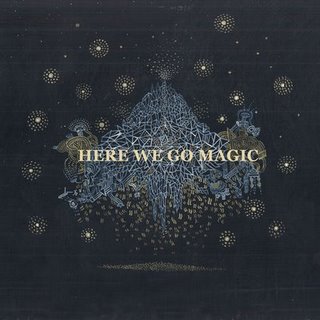
35 :: Here We Go Magic
Here We Go Magic
(Western Vinyl)
Let me start with a spurious generalization: 2009 was a year when a lot of folk, roots, or generally acoustic-minded people got weird. The nostalgia of retro-fetishist alt-country became more accommodating to the progressive tendencies of noise and concrete types, and along with more groan-worthy movements like “lo-fi” and “chill wave” this meeting of unlike aesthetics became a genuine trend. Luke Temple’s Here We Go Magic project joins Megafaun and the Woods in this class of bands that have been blending these sounds for years but seemed to really hit their stride, and the blogs, in 2009.
Temple’s compositions are almost maddeningly circular, returning again and again to the same vocal lines and chords as if the meaning they’re searching for is there all along, they just have to drill for it. Highlights “Only Pieces” and “Tunnelvision” swirl in a jumble of acoustic guitar and atmospheric electronics that provides a new and overdue spin on the whole singer/songwriter thing. His focus isn’t on lyric or melody but texture, and so the single “Tunnelvision” stands with transitional pieces like “I Just Want To See You Underwater” and full-on ambient tracks like “Nat’s Alien” in a spectrum from traditional-ish to noise, united in their diversity by Temple’s gentle, swirling sonic aesthetic.
Trend or no trend, the songs on Here We Go Magic whirl and billow unawares. Indeed, Temple has bigger things on his mind (“What’s the use in dyin’, dyin’?” he asks on “Only Pieces”), and his blend of acoustic songsmithing, occasional world sounds, and long-wash ambient soundscapes cannot be reduced to hipster-baiting. What emerges from this self-titled debut is a reverb-soaked compromise between opposing parts of Temple’s brain, and the magic is he’s able to blend them without pretentiously showing off their dissimilarity or watering down the boldness of either. His songs retain their simple wonderings and his ambient leanings their tinkering serenity. Listen, then, and in tribute make of your enemy a friend. And when you do, take a cue from Here We Go Magic and don’t get all braggy about it.
David Ritter
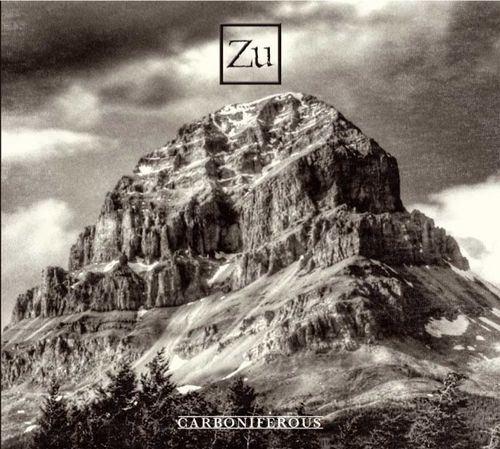
34 :: Zu
Carboniferous
(Ipecac)
I’ll keep this short, because I am simply beyond analysis when it comes to the primal viscera splattered all over Carboniferous. Not that trying isn’t fun: think Confusion is Sex (1983) as performed by Bonham and Jones, or, as my friend Sean put it, Lightning Bolt covering Trout Mask Replica (1969) in the middle of a knife fight. Except that the knives fly through the speakers at you. So yeah, I got hit, and I’m gushing. Arty, dissonant, weird, and completely brutal, Zu runs through the gamut of heavy terms—onslaught, maelstrom, ferocious, volatile, crushing, overwhelming—and restores meaning to them, as if all previous usage was incorrect. The vast majority of this record is improvised, which is first of all manifestly unfair, but it helps to showcase the blinding telepathy at work. The bass has a ton of distortion on it, and it sounds like twenty things at once, and the drummer is just a machine, and there’s a bari sax and that’s it, and god damn it it’s all so musical. The Melvins’ King Buzzo guests, and one barely notices. Metal, no wave, punk, post-punk, and free-jazz all meet in a blast furnace and…I mean, I can’t even. Buy this album. Play it loud.
Christopher Alexander
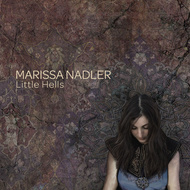
33 :: Marissa Nadler
Little Hells
(Kemado)
Though Marissa Nadler sings in an affected, anachronistic warble and at random uses old-timey diction, her lyrics are far too bare and concise to be considered stilted. What could sound disingenuous in lesser hands is instead a disembodied voice floating in the cobwebbed attic of a Victorian house, physically detached from the living world yet inextricably tied up in all its pain and sorrow. Of course, to some extent all her affectation just seems like a gimmick, as Chet has noted, but Nadler pulls it off so elegantly on Little Hells, her latest and most accomplished album, that it becomes more a product of her insular, carefully built universe than a conscious attempt to make it quirky or, um, spooky.
By now her imagery has become seamless in its conflation of individuals and memories, reality and fantasy. Ghosts and lovers inhabit the same yearning corners of her mind; her music imbues the texture of the brittle, wilting leaves and flowers that adorn and buttress her themes. What’s more, she’s pushing and expanding her gothic folk with subtle but poignant gestures, adding to the gravitas of her words with rippling organ (“Little Hells,” “Loner”), aching slide guitar (“Rosary,” “River of Dirt,” “Mistress”), and steadily rolling percussion (“Mary Come Alive,” “River of Dirt”). While there’s very little distinguishing Little Hells’s midsection from her work on 2007’s Songs III: Bird on the Water, the pair of one-two punches that bookend this album hint that even greater things are in store for the Nadler camp. Little Hells is familiar songwriting from an artist totally sure of herself; no doubt her next piece of quiet devastation will be worth the wait.
Traviss Cassidy

32 :: Lee Fields & the Expressions
My World
(Truth and Soul)
I’m guessing most CMG readers were first turned on to Lee Fields via his smokin’ slowjam with Sharon Jones, all Ike-and-Tina-style, on her “Stranded In Your Love”; ironic since Daptone Records scion Gabriel Roth actually first discovered Jones when she was singing backup at one of Fields’ late-90s recording sessions. Though he was once referred to as “Little JB” for his obvious stylistic resemblance, Fields’ brand of melancholy, blue-bruised soul is stridently authentic, another awesome product of the 00s revival that’s already gifted us acts like the aforementioned Jones, Naomi Shelton, and the Budos Band. The difference, at least concerning the Budos, is that Fields has been on his game since the 70s.
Despite release on small-scale Brooklyn funk imprint Truth and Soul, the sound of My World is pure Daptone ethos, especially as evidenced in the fact that the Expressions count Menahan Street Band/Dapkings stalwarts Homer Steinweiss (drums) and Leon Michels (jack of all trades) amongst their ranks. While the Expressions are crack players more than capable of socially conscious rave ups like “Money I$ King” and the title track, unlike the Dapkings, their specialty is string-heavy, late-night sojourns over which Fields is allowed ample room to pine for the one(s) that got away, partial to Fields being far more interested in “making sweet love tonight” than burning up the dancefloor. “Honey Dove,” “Love Comes and Goes,” and “The Only One Loving You” are all of a master class in pleading for one more chance between creamy guitar licks and Hammond B-3. The result is smooth and deliberate, a throwback record that’s never sounded more vital.
David M. Goldstein
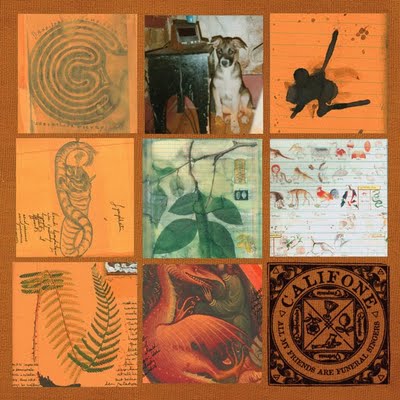
31 :: Califone
All My Friends Are Funeral Singers
(Dead Oceans)
Amidst all the fuzz and fanfare of new acts heralding exciting trends this year, a few workhorses simply stuck around to release more good music in order to go inevitably ignored. Fruit Bats, Rock Plaza Central, Papercuts: just a few of the obligatorily unheard bands who offered us wonderful sounding records outside of popular chatter, records whose charms took months to gestate. At the head of this pack of sleepers is Califone and the band’s ninth full-length, All My Friends Are Funeral Singers, a companion album to singer Tim Rutili’s film of the same name. Both earth-worn and ethereal, it finds its members indulging their greatest tendencies: noisy atmospheres; methodical, stretched-out song structures; a tender knack for catchy, fleeting hooks. And as always, Ruttli’s ragged, honest voice wafts over the loose, open chords while sampled voices and sounds are tucked into the songs’ hidden spaces, chipped at and mossy as if channeled through transistor radios. From the “Bron-y-Aur Stomp” leanings of “Ape-Like” to the heady, almost-electronic groove of “Giving Away the Bride,” I haven’t heard a record quite like it this year—even for a Califone record—so ready to suggest both a southern gothic intensity and stoned indie folk performed in a filthy loft in some northern metropolis; “Alternative Country” if there ever was a more deserving description.





